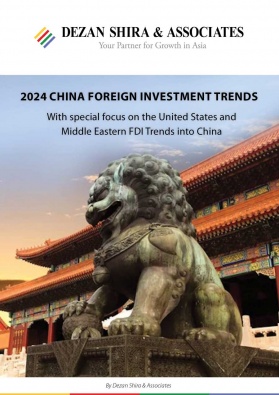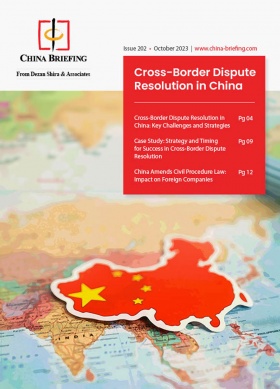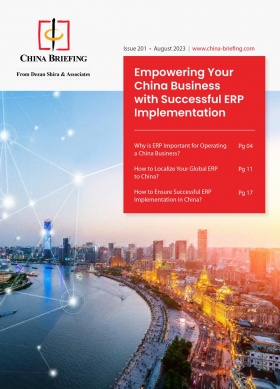China Monthly Tax Brief: November 2023
In our China Monthly Tax Brief for November 2023, we discuss new preferential tax and subsidy policies from key local governments targeting high-quality investments.
Local governments have been ramping up efforts to improve the China business environment and attract investment and talents. These include Beijing’s new plan to boost the service industry and Shanghai’s proposals to deepen reform in the Lingang New Area and optimize the city’s tax service. Besides, Xiongan released its first preferential tax policy to support venture capital enterprises, while Shenzhen is granting generous financial subsidies. In addition, Shenzhen Qianhai Cooperation Zone is offering financial incentives to attract investments and talents.
State Council approves Beijing’s new plan to boost the service industry, covering several tax and finance measures
On November 23, 2023, the State Council released the Working Plan for Supporting Beijing in Deepening the Construction of a Comprehensive Demonstration Zone for the Expansion and Opening Up of the National Service Industry (the “Working Plan”), which outlines 23 tasks for developing the city’s service industry.
The Working Plan commits to improving market access and lifting foreign ownership caps in several industries, including telecommunications, health and medical services, financial services, culture and education, and professional services. For example, a key pledge is to remove the foreign ownership cap in the field of value-added telecommunications in Beijing.
In addition, the Work Plan sets out tasks to:
- Further liberalize forex registration procedures and facilitate cross-border transfer of funds, building upon recent efforts to liberalize the transfer of funds in and out of China;
- Improve the foreign investment environment involve continuous efforts to reduce trade costs and barriers; and
- Facilitate visa procedures for foreign talent.
Among others, in the tax regime, the Work Plan promises to:
- Continue to study tax policies that support the reform of the cultural system and the development of cultural enterprises;
- Implement tax policies to support the buy-back of Chinese cultural relics;
- Support Beijing in exploring the application of digital yuan in public utilities such as tax collection and payment; and
- Explore new models such as the introduction of service trade agents and overseas company proactive declaration and payment of taxes to facilitate cross-border capital settlement in service trade.
In the foreign exchange management and cross-border funding settlement area, the Work Plan commits to:
- Deepen the trial of a settlement account system for banks combining local and foreign currencies and continue to expand the number of participating banks;
- Expand the pilot project of integrating local and foreign currency capital pools for multinational companies, explore ways to optimize quota management, and improve the efficiency of capital pools;
- Support enterprises in the zone to purchase foreign exchange overseas directly and pay to overseas exporters;
- Explore ways to expand the scope of application for issuing overseas RMB loans and conducting domestic securities investment through domestic settlement accounts of overseas institutions (RMB NRA accounts);
- Study the exemption of foreign exchange registration for reinvestment of foreign-invested enterprises;
- Improve the convenience of capital accounts and allow the use of electronic shortcuts to conduct income and expenditure business; and
- Develop new types of offshore international trade through innovation, encourage banks to explore ways to optimize business authenticity verification, and improve trade settlement facilitation for honest and compliant enterprises.
At the same time, the Work Plan also proposes framework measures for exploring rules and norms for emerging business forms, optimizing trade and investment institutional arrangements, improving the policy environment for public services, strengthening the rights and interests’ protection mechanism, and improving the risk prevention and control system.
Some measures mentioned in the Work Plan to reduce trade barriers, protect intellectual property rights, create a fair and transparent business environment for government procurement, further facilitate visa applications for foreigners and their families, and optimize the remittance of salary and income are all key concerns of foreign investment in China.
If well implemented, these measures will enhance foreign investment confidence and solve the practical problems faced by foreign investment in China.
To read more about the impact of the Work Plan on foreign investment, please read our China Briefing Article: Beijing’s New Plan to Boost the Service Industry and Attract Foreign Investment
Shanghai reforms in the Lingang New Area targets offshore trading businesses
On November 17, the website of the Shanghai Municipal People’s Government released a guiding opinion to further deepen the reform in the Lingang New Area. The Several Opinions of the Shanghai Municipal People’s Government on Supporting the Deepening and expanding Special Economic Functions of the Lingang New Area of the China (Shanghai) Pilot Free Trade Zone in the Forefront of High-Quality Development (the “Several Opinions”), which include 29 items, put the focus on digital trade, emerging finance, high-end shipping services, and technology trade, among others.
To support the development of offshore trade, the “Several Opinions” stipulate that Shanghai will support the setup of the “Kuajingtong” platform in the Lingang New Area and improve its audit capacity of offshore trade.
In addition, the Shanghai government will actively strive for the support of relevant state departments to promote the exemption of stamp tax for offshore trade business in the new area.
Shanghai encourages eligible enterprises to apply diversified tax guarantee method
On November 24, 2023, the People’s Congress of the Shanghai Municipal city released the revised draft of the Shanghai Municipal Regulations on Promoting the Construction of International Trade Center, which was open for public comments from November 24, 2023 to December 8, 2023.
The revised draft, consisting of nine chapters and 60 articles, aims to optimize and upgrade the trade in goods, promote openness and innovation in trade in services, cultivate new driving forces for the development of digital trade, and enhance the ability to prevent and resolve trade risks.
Among them, Article 46 clearly states that the Shanghai Municipal tax department shall rely on the electronic tax bureau and other information systems to:
- Provide electronic services such as tax payment for the taxpayers
- Facilitate export tax refund; and
- Improve the efficiency of tax refund review.
In addition, Shanghai encourages qualified enterprises to apply the diversified tax guarantee method to improve the efficiency of capital use and cargo clearance.
Xiongan New Area unveils its first favorable tax policy, offering preferential CIT treatment for venture capital
Recently, the Ministry of Finance (MOF), together with the State Taxation Administration (STA), the National Development and Reform Commission (NDRC), and the China Securities Regulatory Commission, jointly released the Circular on Piloting Favorable Corporate Income Tax Policy for Venture Capital Companies in Xiongan New Area (Caishui [2023] No.40), with retroactive effect from January 1, 2023.
This is the first tax policy released for the Xiongan New Area. The eligibility criteria and corresponding preferential treatment is summarized as below:
| Who can enjoy? | What is the policy | How much tax can be saved? | Eligibility |
| Venture capital company in Xiongan New Area | Where the company
The corporate income tax (CIT) for the year would be halved as per the shareholding proportions of its individual shareholders at the end of the year.
|
CIT exemption = Shareholding proportions of its individual shareholders at the end of the year × CIT payable for the year ÷ 2 | The venture capital company should:
|
Where the company
The CIT for the year would be waived as per the shareholding proportions of its individual shareholders at the end of the year.
|
CIT exemption = Shareholding proportions of its individual shareholders at the end of the year × CIT payable for the year |
For equity investments that occurred before January 1, 2023, where the income obtained from the transfer of equity falls within the execution period of the Caishui [2023] No.40, the venture capital company can enjoy the preferential policy by satisfying the provisions.
To be noted, this preferential policy is only applicable to CIT. Dividends obtained by individual shareholders are still subject to individual income tax (IIT) in accordance with relevant regulations.
Similar policies have been piloted in the Zhonguancun National Independent Innovation Demonstration Zone of Beijing and certain areas in Shanghai since 2020 and 2021.
Such initiatives aim to encourage and support venture capital investment by individual investors and reduce their double tax burden of having to pay both CIT and IIT on high-risk returns at the initial investment stage.
Shenzhen grants financial subsidies to promote development of venture capital
On November 17, the local Financial Supervision Administration of Shenzhen issued the newly revised Several Measures to Promote the Sustained High-quality Development of Venture Capital in Shenzhen, outlining financial subsidies and support policies to encourage the high-quality development of venture capital investment in the city of Shenzhen.
Some noteworthy measures include:
- For newly established or newly moved-in equity investment/venture capital enterprises: Within three years from the date of establishment, the investment management enterprise shall be rewarded of RMB 5 million for every RMB 400 million (or equivalent foreign currency) actual and accumulated investment of non-listed enterprises in Shenzhen. The maximum amount of a single reward should not be more than RMB 20 million.
- For newly established or newly moved private equity investment fund management enterprises: They will be rewarded with RMB 3 million if their actual management scale of private equity investment reached RMB 10 billion (or equivalent foreign currency). They will be rewarded with RMB 5 million if their actual management scale of private equity investment reached RMB 20 billion (or equivalent foreign currency).
- For key venture capital institutions: Qualified venture capital management enterprise management shall be rewarded according to 5 percent of the investment income generated when the project was withdrawn in the previous year. The maximum amount of reward for each enterprise shall l not exceed RMB 20 million.
- For enterprise investing in seed-stage or start-up technology enterprises for 2 years and above: Qualified enterprises will be rewarded according to 10 percent of the actual investment amount. The maximum reward for investing in a single enterprise will be RMB 1 million. Where the invested enterprises are related to each other, the reward can only be applied once. The annual cumulative reward for a single equity investment and venture capital management enterprise will not exceed RMB 5 million.
The revised measures are valid until April 7, 2027.
Shenzhen Qianhai offers financial incentives to attract investments and talents
On November 8, 2023, the administration the Qianhai Shenzhen-Hong Kong Modern Service Industry Cooperation Zone released the Several Measures to Promote the Cluster Development of Global Service Providers (the “Several Measures”).
The “Several Measures” further reaffirms 15 percent CIT policy for qualified enterprises (currently effective until the end of 2025) and the IIT subsidy provided to qualified overseas high end talents and urgently needed talents.
Beyond that, the “Several Measures” added multiple incentive measures for newly settled enterprises and their personnel, including:
- For qualified Qianhai global service provider enterprises, a maximum of RMB 30 million will be given to the management team on an annual basis.
- For qualified executives and other personnel of the abovementioned Qianhai global service company, a maximum of RMB 1.5 million will be rewarded to them on an annual basis, and the maximum number of such personnel in a single company cannot go beyond 10.
- Eligible Qianhai global service provider enterprises will be given a settlement reward of up to RMB 3 million.
- Qianhai global service provider enterprises renting office space in Qianhai will be given a rental subsidy of RMB 60/square meter/month for 36 consecutive months, with a maximum of RMB 5 million per year for each enterprise.
- Qianhai global service enterprises purchasing property in Qianhai will be given a maximum of RMB 30 million of housing subsidies.
- For the global service provider enterprises that meet the headquarter standards of Qianhai, a maximum of RMB 10 million yuan can be rewarded.
- For Qianhai headquarters enterprises that are rated as “World Top 500” enterprises for the first time, they can enjoy a one-time reward of RMB 10 million.
Also read
- China Monthly Tax Brief: October 2023
- China Monthly Tax Brief: September 2023
- China Monthly Tax Brief: August 2023
- China Monthly Tax Brief: July 2023
- China Monthly Tax Brief: June 2023
The information provided is for general purposes only and may not account for local variations. No liability is assumed for the completeness or accuracy of the information. For personalized advice on specific business queries, consult our experts at Dezan Shira & Associates by emailing China@dezshira.com.
About Us
China Briefing is written and produced by Dezan Shira & Associates. The practice assists foreign investors into China and has done so since 1992 through offices in Beijing, Tianjin, Dalian, Qingdao, Shanghai, Hangzhou, Ningbo, Suzhou, Guangzhou, Dongguan, Zhongshan, Shenzhen, and Hong Kong. Please contact the firm for assistance in China at china@dezshira.com.
Dezan Shira & Associates has offices in Vietnam, Indonesia, Singapore, United States, Germany, Italy, India, Dubai (UAE), and Russia, in addition to our trade research facilities along the Belt & Road Initiative. We also have partner firms assisting foreign investors in The Philippines, Malaysia, Thailand, Bangladesh.
- Previous Article Digital Recruitment in China: Definition, Strategies, and Best Practices
- Next Article How China is Adapting to the World Bank’s B-READY Business Environment Benchmark








